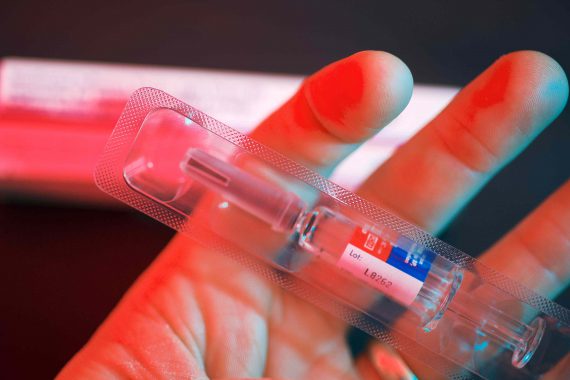GPs are to be given access to extra supplies of flu vaccine from the Government’s central stockpiles from next week as part of the drive to achieve higher uptake rates this winter.
The Department of Health and Social Care (DHSC) said GPs will be able to order ‘top-up’ supplies through NHS England from Monday 18 October and can expect to see new stock arriving from early November onwards.
New guidance published on Friday said: ‘DHSC has secured an additional supply of influenza vaccines, as a temporary measure for this year only.
‘These vaccines will be available for NHS providers, general practices and community pharmacies, to top up local supplies once they run low and will be deployed to areas where it is most needed to maximise uptake.’
It added: ‘Providers should work with commissioners to ensure stock is prioritised to where it is needed most, in eligible cohorts under the NHS programme where uptake is lower. Additional supply arrives later in the season and is intended to complement existing supply.’
GPs can order a minimum of 50 doses at a time and should ‘aim not to place more than’ two orders, the guidance said.
It added: ‘The central stock is limited, so allocations have been made for each region based on population sizes.’
The additional vaccines are ‘intended to be used as additional stock to boost supply and not as a replacement for local stock’ so practices ordering from the central stock must not return any locally-sourced vaccines to suppliers, the DHSC said.
It added: ‘Practices should determine if there is a need for further flu vaccines by assessing current uptake rates in eligible cohorts (taking into account booked clinics) including registered patients vaccinated elsewhere, and calculating the amount required to vaccinate those outstanding patients compared with the practice’s current vaccine supply and orders yet to be delivered.’
Any unused central stock will not be returnable so practices with any left over ‘towards the end of the season’ must alert commissioners and aim to redistribute it to another provider, the guidance said.
It added: ‘In light of high demand for flu vaccine this season and the significant expansion of the programme – along with the ability to redistribute stock locally in line with MHRA guidelines – it is not expected that any DHSC stock will go unused, although any given batch of vaccine ought not to be moved more than once under these mutual aid provisions.
‘However, in the very unlikely circumstance that a practice finds itself with a small amount of unused DHSC stock and only after notifying your regional NHSEI commissioner and making every effort to redistribute the stock, practices will be required to dispose of any unused DHSC stock themselves.’
Practices must keep ‘clear records’ of any redistributed or destroyed vaccines and ‘will be required to submit this information as part of a post-payment verification exercise’, it said.
Primary care networks (PCNs) can use the additional flu vaccines to co-administer flu and Covid jabs but stock must be ordered by individual member practices rather than PCN groupings, the guidance said.
Practices will be provided with the DHSC vaccines free of charge so will only be able to claim an item of service (IoS) fee for each centrally-supplied jab that is administered, it added.
Then vaccines minister Nadhim Zahawi confirmed last month that the Government planned to procure flu vaccines centrally alongside the ‘traditional procurement through GPs and pharmacies’.
Practices were previously advised they would not have access to Government-procured stock – leading to warnings from GPs that their own supplies of jabs may run out.
However, with the flu programme mired in uncertainty this year – with patients likely to be able to get their flu vaccination while getting their Covid booster shot in non-GP settings – there had also been concerns practices could be left with surplus stock.
Last winter’s flu vaccination programme saw the creation of a central supply of adult flu vaccines after eligible cohorts were expanded – but it later transpired around 1.7 million unused jabs were destroyed following the end of the campaign.
Meanwhile, this year’s expanded flu vaccination programme got off to a rocky start when hundreds of appointments were cancelled due to delivery delays caused by ‘unforeseen road freight challenges’.
Ministers insisted the delays would not derail this year’s vaccination programme which comes amid warnings that outbreaks of influenza and respiratory syncytial virus (RSV) could lead to double the number of related hospital admissions this winter.
The record-sized flu vaccination programme is due to target 35 million people across the UK.
Pulse October survey
Take our July 2025 survey to potentially win £1.000 worth of tokens













